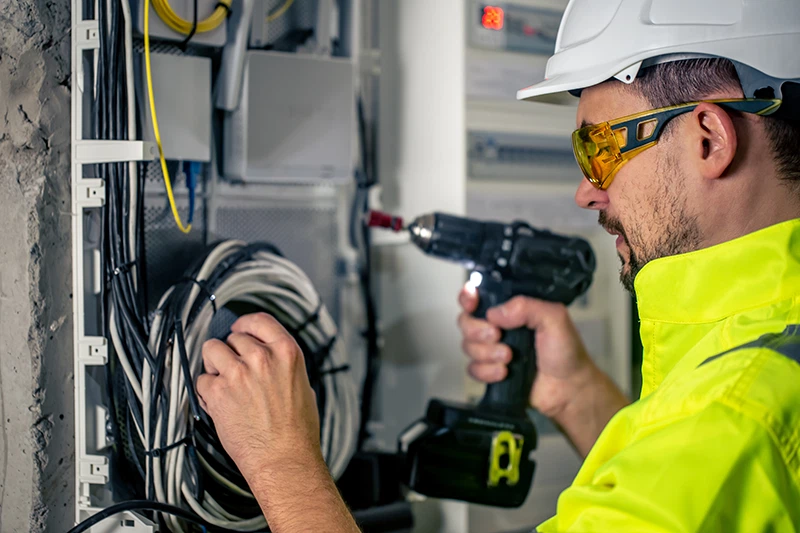Hearing an unusual electrical buzzing sound at home can be unsettling, especially when you can’t immediately locate the source. In many cases, electrical buzzing isn’t just an annoyance; it may signal an underlying issue that requires attention.
From a minor loose wire to a potentially hazardous fault, it’s essential to understand what these sounds mean and when to call in a professional. This guide outlines the common causes of electrical buzzing in UK homes and what actions to take to keep your household safe.
Loose Wiring or Connections
Loose or poorly secured wires are a frequent cause of buzzing noises.
- Outlets and light switches: If you hear a faint hum when a socket or switch is used, the wiring behind it could be loose.
- Ceiling lights: Buzzing from overhead fixtures often points to loose connections or worn fittings.
- Consumer unit (fuse box): Call an electrician immediately when the fuse board buzzes. It may signal a loose wire or a damaged circuit breaker.
Buzzing from wiring is never something to ignore. Even if the sound is intermittent, it may pose a fire risk if left unaddressed.
Overloaded Circuits or Electrical Demand
Too much demand on a single circuit can lead to a buzzing or humming sound, especially during peak usage.
- Multi-socket adaptors: Overloading plug sockets with multiple high-draw appliances can stress circuits.
- Old wiring: In older homes, the original wiring may not be suitable for modern appliances like kettles, tumble dryers, or EV chargers.
- Buzzing at the fuse box: This may indicate your consumer unit is struggling to handle the electrical load.
If you suspect circuit overload, unplug a few items and see if the noise stops. For long-term safety, consult a qualified electrician for a load assessment.
Dimmer Switches and Lighting Issues
Lighting is a common culprit behind buzzing, particularly when dimmer switches are involved.
- Low-voltage LED bulbs often buzz when used with older or incompatible dimmer switches.
- Fluorescent lights: Tube lighting can hum as the ballast degrades or ages.
- Loose bulbs: A bulb that isn’t screwed in properly can cause minor electrical arcing, resulting in a faint buzzing sound.
To eliminate these issues, ensure you’re using compatible bulbs and switches, and consider replacing ageing lighting systems with modern, silent alternatives.
Appliances and Electrical Devices
Sometimes the buzzing isn’t from your wiring but from appliances in use.
- Fridges and freezers: Normal operation can cause humming sounds, but loud or persistent buzzing may indicate a motor or compressor fault.
- Chargers and transformers often emit a low electrical noise due to internal coil vibrations, especially when plugged in but not charging.
- Microwaves or kettles: Buzzing during use is typical, but any sparking sounds should be investigated immediately.
If the noise stops when an appliance is unplugged, that’s a good indicator that the item, not your home’s electricity, is to blame.
When to Call a Professional
Electrical buzzing can be harmless, but can also be a sign of something more serious.
- Persistent or loud buzzing warrants immediate attention, especially near sockets or the fuse board.
- Burning smells or heat: If buzzing is accompanied by heat or a burning odour, shut off the power at the consumer unit and call an electrician.
- Older homes: Properties with outdated wiring or no RCD protection should be inspected more frequently.
If in doubt, always err on the side of caution. Only a qualified and trusted electrician can safely diagnose and repair electrical faults in line with UK wiring regulations (BS 7671).
Electrical buzzing in the home can be caused by anything from ageing appliances to serious wiring faults. While not all sounds are dangerous, none should be ignored.
If you’re unsure where the noise is coming from or suspect a safety issue, it’s best to call a registered electrician. Staying proactive helps prevent minor issues from becoming costly or dangerous.








